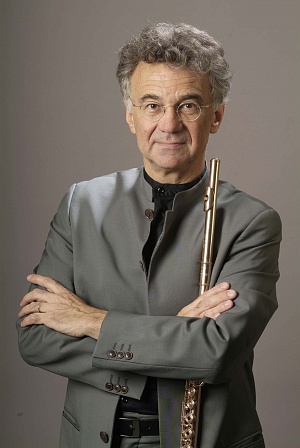
ANDRÁS ADORJÁN RECALLS JEAN-PIERRE RAMPAL
ON THE OCCASION OF THE RELEASE OF HIS SUPRAPHON RECORDINGS


The Hungary-born flautist András Adorján grew up in Denmark, where he studied dental surgery and music in Copenhagen. He subsequently took lessons from Jean-Pierre Rampal and attended the master class of the Swiss flautist Aurèle Nicolet. In 1987, Adorján was named a professor at the Hochschule für Musik und Tanz in Cologne, and he has taught annually at the Rampal Music Academy and other master classes. He has regularly sat on the juries of major flute competitions, and serves as President of the German Flute Society.
At the end of March, András Adorján arrived in Prague upon the invitation of the Prague Conservatory, where he performed within the Flute Days festival and launched a new Supraphon album, featuring the remastered complete recordings the famed French flautist Jean-Pierre Rampal made for the label (SU 4217–2).
How would you define the significance of Jean-Pierre Rampal for the flute?
Rampal played a vital role in promoting the flute, elevating it to a position comparable to that of the violin. He actually presented the flute as a solo instrument.
How did Rampal choose the repertoire he explored and performed?
A very inquisitive man, he would regularly visit libraries and archives, commission new music for the flute, discovered and rediscovered works, and whenever he deemed a piece intriguing, he would record it. Owing to Rampal’s relentless exploration, we flautists have become acquainted with plenty of wonderful music.
What about contemporary music? Did he devote to that as well?
Contemporary music was simply part of his life. As I have said, he strove to raise the flute to the position of a paramount instrument – this, however, cannot be attained without playing contemporary music. Whenever he met an interesting composer, he asked him to write a new piece. Many of these works are still performed, forming the core of the flute repertoire.
You launched in Prague the release of a new Supraphon album, which features the complete recordings Rampal made for the label. What do you consider to be the main asset of these remastered tracks?
It is of vital importance not to forget about the great musicians of the past. Life at the present time is fast – so when you today ask young players to name some flute legends, few of them can recall Jean-Pierre Rampal and Aurèle Nicolet. To date, young people have not had the opportunity to listen to many of the recordings made by the two great flautists – and the new, remastered album can change this undesired state of affairs. They don’t have to hunt down the old vinyl discs or some CDs, which are no longer in the catalogue. That is why I am very happy about the release. It is a great pleasure for everyone!!
Is there any special advice that Jean-Pierre Rampal gave to you?
I think the best advice for me, as well as all my colleagues, is his idea that a musician should perfectly master his instrument. In that case, the audience doesn’t perceive the instrument but the music itself.
You work as a teacher. Have you been anyhow inspired by Rampal in this respect?
Absolutely! I had several teachers, and two of them were true masters, among the best 20th-century flute educators – Jean-Pierre Rampal and Aurèle Nicolet. I think that both my playing and teaching reflects that which I have learned from the two amazing flautists. And I am certain that during my lessons I often use the very same examples and words that they themselves used … Yet today they are my words, and I am not able to distinguish which of them I have taken them from.
What is the current interest in studying the flute?
I think the interest in studying the flute has waned since the time when I started to play the instrument. I remember that there were far more flautists than there are now. And, above all, there were many more European players than you see now. The flute boom has shifted to Asia. When I look at the flute class at the conservatory in Germany, where I have taught for the greater part of my life, the majority of the students are from South Korea. It is a pity that we do not see as many European students, and I must admit that the young people from Asia really are the best when it comes to the entrance exams.